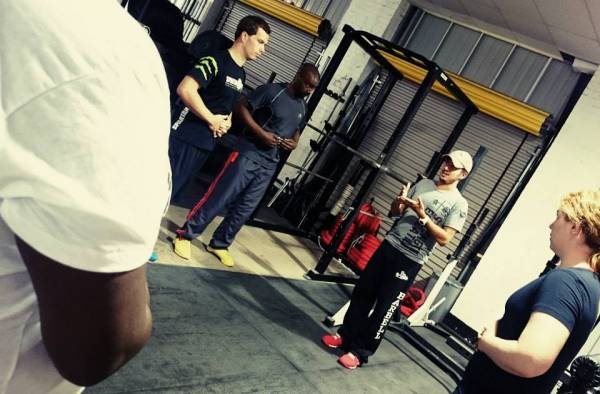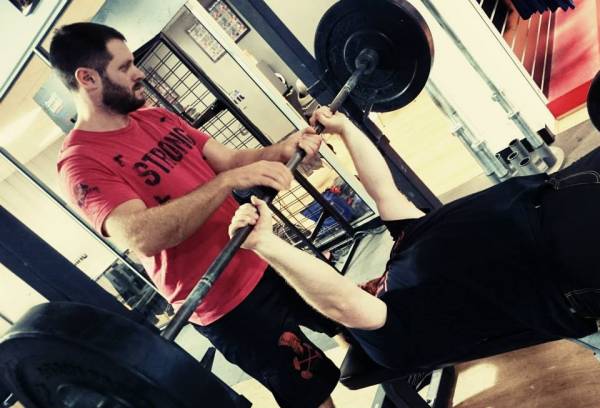You’ve been lifting a while now. It feels like you’ve been training for ages, but in actual fact it’s only been a year or two. You’ve made fantastic progress, and you are leaps and bounds ahead of the new kids coming into the gym. Or so it feels.
You remember what it’s like to be new, so you offer advice at every opportunity about whatever you can. After all, you’ve been doing this for a while now, right?
Be careful. If it feels like you know a lot about strength training (or anything for that matter), that’s probably not the case. Let me explain.
The Best Graph I’ve Ever Seen
This is my favorite graph of all time. If you can’t place yourself on it, you’re a hazard.
We Are All Beginners
The danger of the hazard phase is not only believing you are an expert, but also thinking you are not a beginner. When you approach your lifting with this inaccurate mindset, you ignore any programs or advice that smell of beginner, for fear that these strategies are too basic for you.
Don’t be so quick to dismiss the simple stuff. So many lifters believe they have maxed out their gains through linear periodization and need something more complex in order to continue progressing. But I propose that in 80% of cases, this is simply not true. Continuing with the simple approach can provide you with easy gains for years to come, which means you can save the complex and harder programs for when you actually need them.
“Realizing there is more to know and that your knowledge is not all-pervading will serve you well even when you do accumulate more experience under your belt.”
The beginner approach doesn’t just relate to programming either. The basics of lifting, such as bracing, breathing, and tension are often paid lip service, but not actually practiced. I spend much of my time teaching those who have come to this realization, and who are now taking the honorable step of stripping down what they have built on a shaky foundation and rebuilding from the bottom up (glute pun intentional.)
Even once we move from beginner through hazard to expert, we should retain a beginner mentality – as shown in the graph by the beginner and expert both being defined as an “I know nothing” phase.
Experts Know What They Are Good At
Experts are more knowledgeable than most in one particular area. In the strength world, for example, this area could be powerlifting, weightlifting, hypertrophy, or strength training for a certain sport. Experts are also acutely aware of the limitations of their knowledge. In other words, they realize:
- How much more there is to know within their field.
- That knowing a lot about one field doesn’t mean knowing a lot about everything else.

Experts revel in the basics such as teaching others about proper breathing and tension.
I see this second point disregarded time and again by those who are in the hazard zone. Those who have built up a little knowledge in one area and believe this gives them free reign to dish out advice on any related areas.
Let me give you a typical example. You begin lifting and build up a little experience on different strength programs. You start to learn how your body responds to different stimuli. This does not make you an all-knowing God of Strength, nor does it enable you to give out empirically based advice on conditioning, nutrition, or any vaguely related fields. Here’s a rule-of-thumb: if you need to look up the answer to a question on the Internet, you’re not in any position to give advice on it.
Realizing there is more to know and that your knowledge is not all-pervading will serve you well even when you do accumulate more experience under your belt.
Experts Are Not Self Proclaimed
If you have to convince others you’re an expert, then you’re not an expert. I don’t believe in the concept of an expert. The concept suggests a finite destination, a line you cross where you move from not-an-expert to expert. Once you realize it is about the journey and not the destination, you are on your way to a deeper understanding.
“So by all means, spread the good word about your approach to exercise, strength, movement, or anything else, but realize there are other options.”
Being on a journey means there is no specific point at which you become an expert. Your expertise will be defined by your actions, which are a product of your thoughts. Stay humble and open, ground yourself in the fundamentals, continually refine your outlook, and you’ll soon gather a few followers on your journey.
There Is No One Right Way
If what you are doing works for you, then that’s great. The lifting game is all about results. And if you’ve found a flavor of training that gets you results, I can understand why you’d want to tell everyone about it. You want everyone else to have the same positive experiences. Most of us like to share in this way.
There’s nothing wrong with this, in itself. Sharing of best practice can be a great thing. But remember you are sharing best practice, not only practice. It’s so easy to convince yourself that your newfound passion is the best thing since sliced bread. And from there, convince yourself that what you are doing is the only way of doing things.
Just remember, what others need in order to get results is about them, not you. And not everyone is you. What’s right for you is not right for someone else. Hell, what constitutes “results” will be different for everyone.

Results are dependent upon the individual, not the method.
So by all means, spread the good word about your approach to exercise, strength, movement, or anything else, but realize there are other options. And not only that, but realize these alternative approaches aren’t inferior to yours. They may, in fact, be superior for others or at least fit their beliefs better. And if a goal aligns with our fundamental beliefs, we are more likely to achieve results.
Revisiting the Graph
Take another look at the graph. We have all passed through the hazard zone at some stage in our training lives. But having awareness of it will help you avoid it in future, or at least let you realize you are in it and start to realign your perceived expertise with your actual knowledge.

Remember these four points to guide you along your journey:
- We are all beginners, or should at least think like ones
- Be aware of the limitations of your knowledge
- You never become an expert by telling people you are one
- There is never only one way of doing anything
Check out these related articles:
- The Coaching Manifesto – 6 Rules For Achieving Excellence
- Fitness Lessons Learned: The Essentials From Expert Coaches
- Are You In An Unhappy Marriage With Squatting?
- What’s New On Breaking Muscle Today
Photos courtesy of Strength Education.
Graph courtesy of Simon Wardley.






